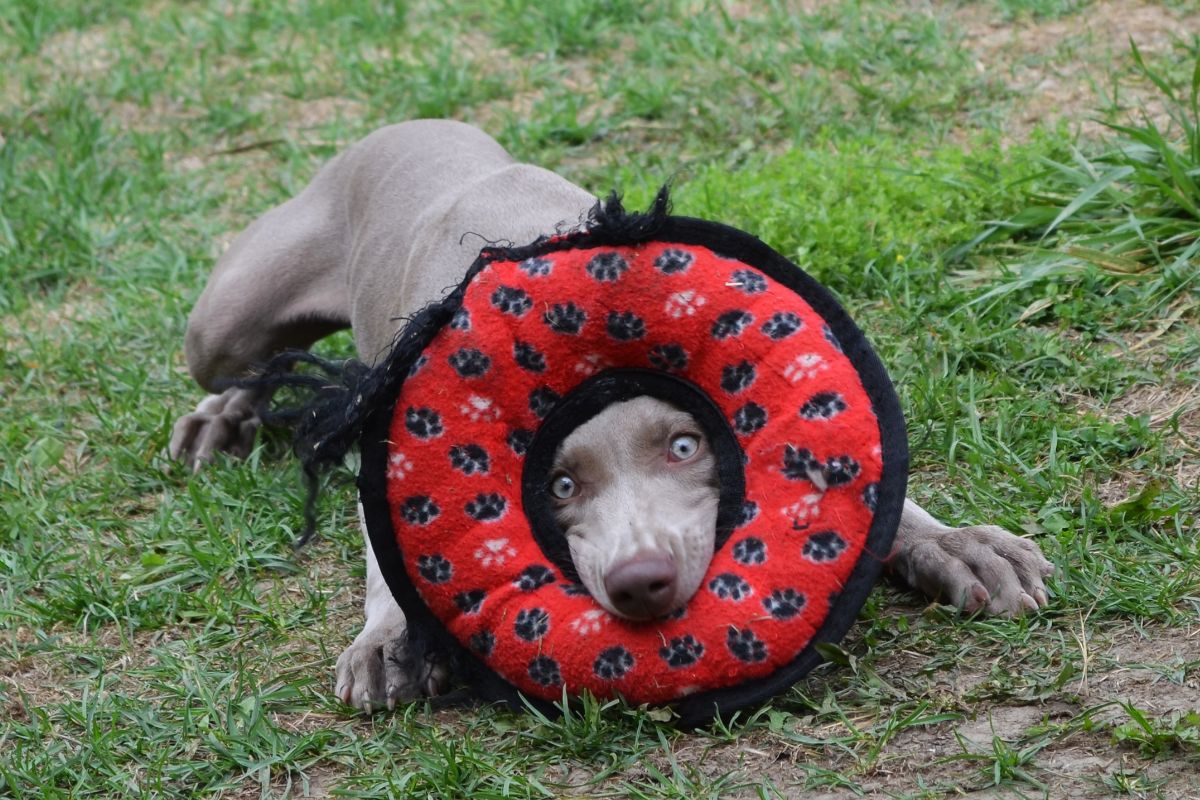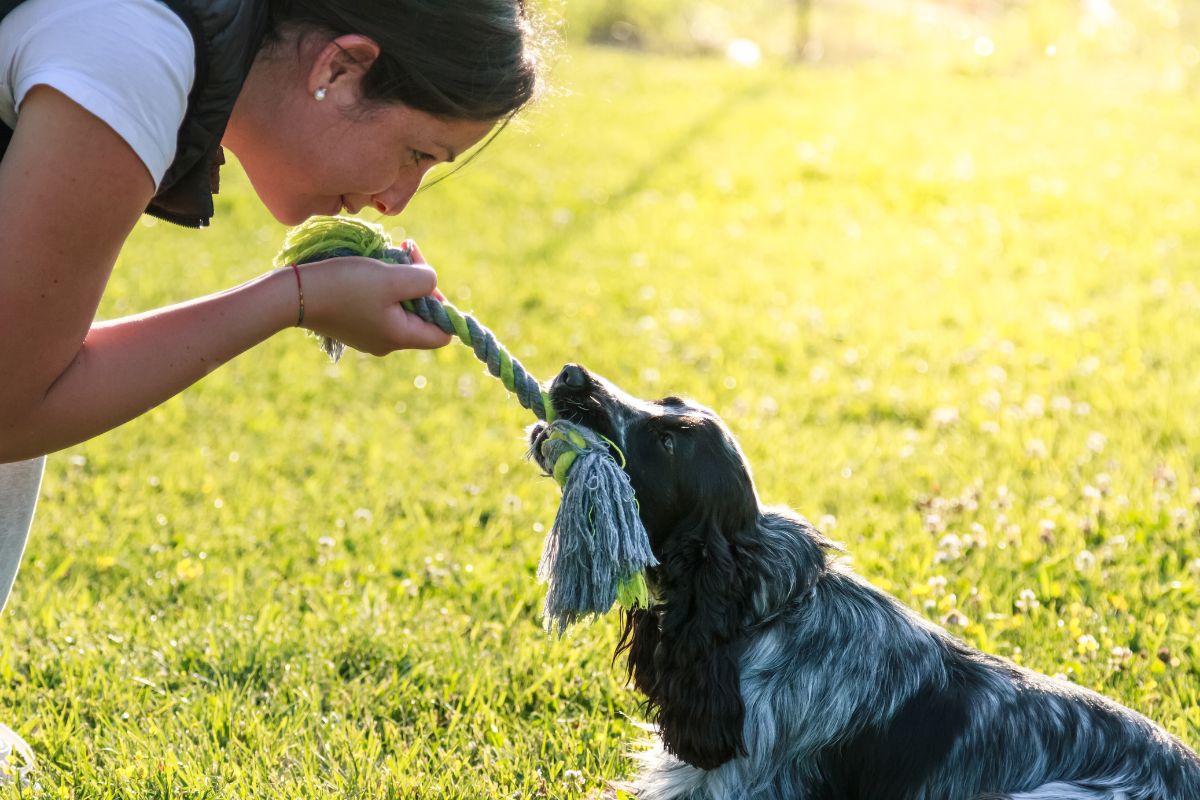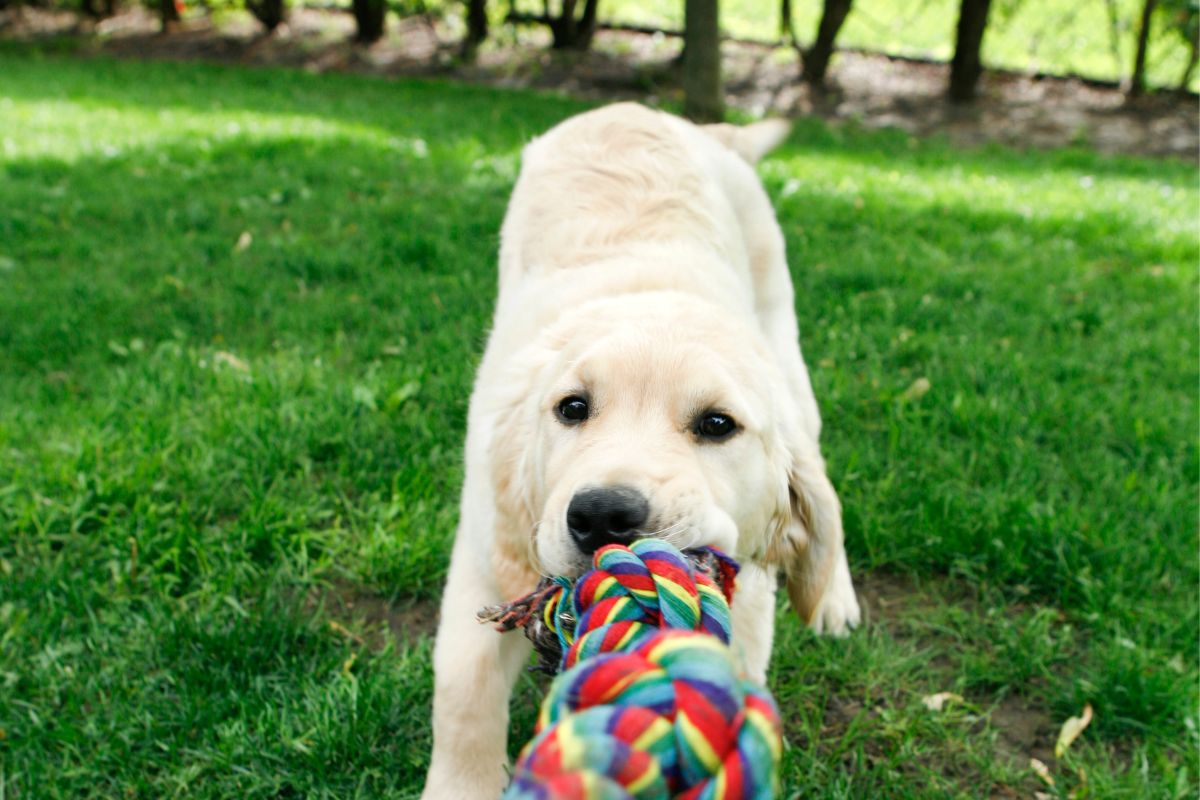Training a puppy can be a challenge at the best of times, even when you know how much work it’s going to take.
If you’ve never trained a puppy before, you might be wondering how you can encourage your puppy to have good manners during playtime.

In this article, we will explore how to encourage good puppy manners during playtime.
So, let’s get started.
A Note On Puppies And Bad Behaviors
It shouldn’t come as a surprise to you that puppies love to play. After all, it’s in their nature, and when they’re not spending their time sleeping or resting, they need a tonne of stimulation.
When puppies play with their siblings, it’s very typical for them to explore their environment and play with their mouths.
It’s important to note that when a puppy becomes tired or over-stimulated, they can nip at each other.
While this is a fairly normal behavior for your puppy to exhibit, they can learn bad habits that they don’t grow out of if they’re not given the right training.
As their owner, it’s up to you to provide your puppy with consistent training to iron out any bad behaviors or nip them in the bud before they become ingrained in their behavior.
Bearing this in mind, when you bring them home with you, you’ll need to train your puppy how not to bite their new family.
Having an understanding of your puppy’s normal play behavior is crucial as you embark on the journey of training them, and will inform your decision making when you’re working out what’s an acceptable way to behave and what isn’t.
When you begin to notice your puppy starting to exhibit bad behavior, such as chewing on the furniture and your hands, you will be able to take certain steps to curb these specific behaviors!
Why Is Playtime Important For Your Puppy’s Development?
Puppies enjoy playing for many reasons, but mainly it comes down to exploring the world around them whilst learning vital social skills with other humans and animals.

While you might think it’s just something that puppies naturally do, playing is essential for your puppy’s physical growth and mental development!
So, let’s take a closer look at why playtime is important for your puppy.
Exercise
First up, we have exercise. As it isn’t safe to take your puppy outside or walk them until they have had their second vaccinations, playtime is crucial for their exercise needs.
Your puppy can relieve some of their excess energy and boredom in a healthy and productive way.
If you don’t help your puppy to burn off their energy, they can begin to show destructive behaviors as a result of pent up energy that they need to expend.
When a puppy becomes destructive, they can cause all sorts of trouble, such as chewing up your expensive furniture.
If your puppy is displaying destructive behaviors, then the chances are that they need a little more exercise and the appropriate stimulation through playtime.
That being said, your puppy needs a lot of downtime to rest and sleep, so playtime should be in moderation. Their playtime shouldn’t last longer than 15 to 20 minutes at a time.
Important Note:
Even if you regularly provide your puppy with stimulation and play time, they can still get up to mischief if you leave them unattended.
This comes down to the fact that playtime won’t eradicate their desire to explore, so make sure that you incorporate structure into their routine to prevent this from happening.
For instance, you can place them back into their crate to rest after you have finished up playing together.
Mental Stimulation
Another reason why playtime is essential for your puppy is mental stimulation.
Some toys, such as Kongs, are toys that can be filled with treats and are specifically designed to work their brains, making your puppy think and rewarding them with a treat, too.
You can also plan the games that you play around your puppy and the type of games that their breed enjoys.
Training your retriever to play “Fetch” is a great way to stimulate their brain by getting them to listen to your commands and providing them with a good amount of exercise.
Offering your dog this kind of mental stimulation works to alleviate their boredom and help to keep them busy, meaning they’re less likely to resort to destructive behaviors.
Training
Incorporating certain commands into your puppy’s playtime is a good way of getting more training in.
If you have enrolled your puppy in a puppy training class, you can use playtime to enforce the commands that they are currently learning such as “Come, Drop-it, Sit and Fetch” when playing with toys.
Bonding
Bonding is a huge part of you and your puppy getting to know one another, and playtime is one of the most essential parts of bonding.
Playing with your puppy is one of the best ways to encourage your puppy to trust you, and begin to build the foundation of a lifelong friendship.
Every puppy is different.
Offering them a variety of different toys allows you to discover all of the quirks that make your puppy your puppy, allowing you to understand their unique personality and which games they enjoy the most.
Socialization
Last, but by no means least, an important aspect of playtime is socialization.
When your puppy is allowed to play with other puppies, they will begin to understand the boundaries of other puppies and learn not to bite.
A puppy is sure to yelp if another puppy nips too hard, indicating that the nipping pup needs to stop. This is beneficial to your puppy to learn good manners and understand boundaries.
That being said, you will need to make sure that someone is monitoring your puppy when they play with other puppies in order to step in if things get a little too playful.
How To Encourage Good Puppy Manners During Playtime
There are a variety of different ways you can encourage good puppy manners during playtime.
These include but are not limited to:
Start Training As Soon As You Bring Them Home
You hear it all the time, but it’s important to start training your puppy as soon as you get them home.
You should aim to keep their training sessions short, at around 5 to 10 minutes per session.
This comes down to the fact that your puppy will tire and lose concentration after this time has elapsed, meaning that they won’t be able to take on new information and could end up getting confused.
While you should keep your puppy’s training sessions short, keeping consistent with training sessions is essential to them learning good manners.
Make sure that you have plenty of treats on hand to give to your puppy when teaching them simple commands such as “Drop-it.
Puppies that naturally have higher energy levels might need to learn the “Drop-it” command earlier on than other puppies.
If your puppy is stubbornly holding onto something, you can teach the “Drop-it” command by using another toy or treat that you know they love.
With the original item in their mouth, tell them to “Drop-it,” before showing them the new toy or food.
Once they have released the toy, make sure you reward them with plenty of praise as well as a treat.
This will positively reinforce the command, and over time, it will become like second nature once they hear the command.
Practicing basic obedience commands when they are playing is a great way of stimulating your dog’s brain, whilst also teaching them something new. It’s a win-win situation.
Use Your Tone Of Voice To Your Advantage
Sometimes a puppy can become over-excited just by being around excited people.
If your puppy is overly-excited, it’s important to note both your energy level and the tone of voice you’re using and make the necessary adjustments.
For instance, if you seem excited and are talking in a very high pitched voice, then your puppy might see this as a reason to be excited too.
You need to be calm if you’re in with a chance of helping your puppy to calm down, as they are good at feeling your energy and mimicking you.
If altering your tone of voice and energy levels doesn’t work, you will want to give them a time out by removing them from the stimulating situation and allow them to settle down in their crate with a chew toy.
Incorporate A Playtime Into Your Puppy’s Daily Routine
By now you already know how important playtime is to your puppy’s mental and physical development.
A good way of encouraging good puppy manners is to incorporate playtime into their daily routine.
Even if you’re busy or have a crazy schedule, make sure that you are ensuring your puppy is getting enough playtime throughout the day.
If you don’t have the time to play with your puppy, then you will need to find someone who can step in for you that particular day.
While you might think missing a day or two is fine, you need to make sure that you’re sticking to a routine.
Setting aside the time to play with your puppy every single day will help you to enforce basic commands and will also help your puppy to develop good playtime manners through this consistent routine.
Be Strict With Your Puppy’s Nap Times
Puppies are playful creatures, and they’d likely play all day if you let them, but sleep is absolutely crucial to their development.
Even though puppies might need to be persuaded to go to sleep, allowing them to get overtired can be detrimental to their playtime manners.
A good way to ensure your puppy is getting enough sleep is to place their bed in a quiet area of the house that doesn’t achieve much foot-traffic.
This gives your puppy a quiet place to wind down when they are showing signs that they need to sleep.
Another way you can encourage your puppy to sleep is to leave them undisturbed when it is nap time. While it’s a lovely feeling to have your puppy fall asleep on your lap, you want to encourage them to become independent.
You’re not going to be there every time they need to sleep, so leaving them alone is essential if they’re going to learn how to fall asleep on their own.
How To Discourage Bad Behavior During PlayTime
While there are many ways to encourage good behavior, there are always ways you can discourage bad behavior. These include but are not limited to:
Don’t Allow Bad Behaviors To Continue During Playtime
If your puppy begins to bite or chew on you or your furniture when they are playing, then don’t allow the bad behavior to continue during playtime.
If they can’t play nicely, then remove them from the stimulating setting and put them in their crate until they have calmed down.
Allowing them to continue playing as normal when they’re displaying negative behavior will only encourage them to learn that this is an acceptable behavior.
Don’t Allow Your Puppy To Nip At You
As soon as you bring your puppy home, it’s important to work on those nipping behaviors.
You shouldn’t allow your puppy to nip at you, as allowing them to do so will instill that it’s okay for them to exhibit these behaviors with other people and animals.
Teaching them from the get-go that it’s not acceptable is the only way to ensure your puppy is going to be safe to socialize with others.
Don’t Leave Your Puppy Unsupervised During Playtime
Puppies can get bored very easily, even if they’ve spent a significant amount of time playing already that day.
That being said, you should avoid leaving your puppy alone and unsupervised during playtime.
Your puppy might resort to destroying furniture or their own toys, especially with toys that they can easily pull apart.
You don’t want your puppy to accidentally ingest parts of destroyed chew toys, so be careful when you’re selecting toys and opt for high quality ones that can withstand your puppy’s sharp teeth.
In Summary
So, that’s how you encourage good puppy manners during playtime.
I hope you have found this article useful and have plenty of ideas to be getting on with to help encourage good puppy manners during playtime.
Remember that your puppy is experiencing the world away from their siblings and mother for the first time, so always remain patient when it comes to training your puppy.
Good luck and have fun training your puppy!
- 8 Signs That Your Dog Is In Heat - November 8, 2022
- Why Is My Dog Whining Whilst Carrying A Toy In Their Mouth? - August 17, 2022
- Reasons Why Your Dog’s Poop Is White And What To Do About It - August 17, 2022
